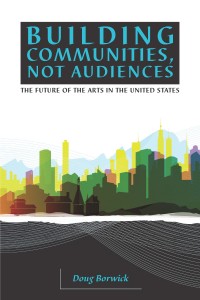Building Communities Not Audiences the Future of the Arts in the United States

Paperback- Order Here
Ebook-Kindle, Nook , bachelor at iBookstore (using iBook app)
For data on majority purchases (≥ 10), click here
Online Excerpts
Building Communities, Not Audiences: The Future of the Arts in the U.S., written and edited past Doug Borwick, holds that established arts organizations, for practical and moral reasons, need to exist more than deeply connected to their communities. It serves equally an essential primer for any fellow member of the arts community–artist, administrator, board member, patron, or friend–who is interested in the future of the arts. Information technology besides provides new ways of looking at the arts as a powerful strength for building better communities and improving the lives of all.
It is from community that the arts adult
and information technology is in serving communities that the arts volition thrive . . .
Communities do non exist to serve the arts;
the arts exist to serve communities.
Edifice Communities, Not Audiences identifies the factors that serve to isolate established arts organizations from their communities, points out the trends that loom as imminent threats to the long-term viability of the artistic condition quo, and presents principles and mechanisms whereby arts organizations can significantly extend their reach into the community, supporting enhanced sustainability. Included are example studies and examples of successful community engagement work beingness conducted by arts organizations from around the U.S. 20-three contributors, representing chamber music, dance, museums, opera, orchestras, and theatre as well as an array of arts assistants perspectives provide breadth of coverage.
The economic, social, and political environments out of which the infrastructure for Western 'loftier arts' grew accept inverse. Today's major arts institutions, products of that legacy, no longer do good from relatively inexpensive labor, a nominally homogeneous culture, or a polity openly managed by an elite grade. Expenses are rising precipitously and competition for major donors is increasing; as a result, the survival of established arts organizations hinges on their power to engage finer with a far broader segment of the population than has been true to appointment.
See besides: Engage Now! A Guide to Making the Arts Indispensable
——————————
From the Foreword by Rocco Landesman, Chairman, National Endowment for the Arts:
"I think the days of the arts in ivory towers are behind usa; the very best arts organizations are . . . connecting communities with artists . . . . Not only tin can the arts build communities, I call up we must."
From the Foreword by Robert L. Lynch, President and CEO, Americans for the Arts:
"Doug Borwick calls for substantive rather than superficial efforts, authentic and systemic changes. . . . The challenge is not whether to build communities or audiences but how to build communities and audiences together."
——————————
Contributors:
Barbara Schaffer Bacon: Co-Director, Animating Democracy
Sandra Bernhard: Managing director, HGOco, Houston Grand Opera
Susan Annoy Booth: Professor, Eastern Michigan University
Tom Borrup: Principal, Artistic Community Builders
Ben Cameron: Program Director for the Arts, Doris Knuckles Charitable Foundation
William Cleveland: Director, Middle for the Study of Art and Community
Lyz Crane: Community Development Consultant
David Dombrosky: CMO, InstantEncore
Maryo Gard Ewell: Community Arts Consultant
Tom Finkelpearl: Executive Director, Queens Museum of Art
Pam Korza: Co-Director, Animating Democracy
Denise Kulawik: Chief, Oneiros, LLC, andDevelopment Consultant to Pillsbury House Theatre
Helen Lessick: Artist and Civic Art Abet
Dorothy Gunther Pugh: Founder & Artistic Managing director, Ballet Memphis
Stephanie Moore: Arts and Culture Researcher
Diane Ragsdale: Cultural Critic, Speaker, Writer
Noel Raymond: Co-Manager, Pillsbury Business firm Theatre, St. Paul, MN
Preranna Reddy: Managing director of Public Events, Queens Museum of Art
Sebastian Ruth: Founder & Artistic Manager, Community MusicWorks, Providence, RI
Russell Willis Taylor: President and CEO, National Arts Strategies
James Undercofler: Professor, Drexel University; one-time President and CEO, Philadelphia Orchestra
Roseann Weiss: Manager, Cat Institute, Regional Arts Commission, St. Louis, MO
Source: https://www.artsjournal.com/engage/building-communities-not-audiences/
Enregistrer un commentaire for "Building Communities Not Audiences the Future of the Arts in the United States"